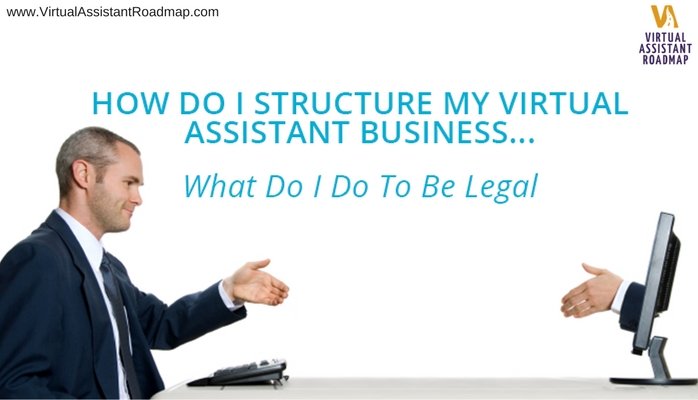Every business, big or small, home based or not needs some form of business license to be authentic. You will also want to make sure you set up a business bank account and keep your finances separate. Rules and regulations vary depending on individual state laws, so make sure you research your area. It is very important you are clean on the type of business you have, or the one you hope to build in the future. This will help determine a lot of the legal steps you’ll need to peruse, since there are different types of license and permits. The Small Business Administration is a great resource to help build your business plan. Then you can start to implement those business plans.
So let’s start with the basics. Most virtual assistants operate their business as a sole proprietor or an LLC.
What is the difference between an LLC and a Sole Proprietorship?
 As a virtual assistant business owner you will need to determine which way you want to drive your business. In a sole proprietorship the owner is personally responsible for business debts. If the assets of the sole proprietorship or partnership cannot satisfy the debt, creditors can go after the owner’s personal bank account, house, etc., to make up the difference.
As a virtual assistant business owner you will need to determine which way you want to drive your business. In a sole proprietorship the owner is personally responsible for business debts. If the assets of the sole proprietorship or partnership cannot satisfy the debt, creditors can go after the owner’s personal bank account, house, etc., to make up the difference.
By contrast, if an LLC runs out of funds, or is in other legal trouble, the owners are usually held liable. As an LLC owner, you are mainly putting your financial contribution to your LLC, not your other personal assets, on the line. However, as an LLC owner, you may still be personally liable for your own conduct or LLC loans in some cases. You will want to make sure you fully research how these different set ups can impact your personal financial needs.
Taxes
 This is a huge portion of what you need to remember if being a virtual assistant or contractor is new to you. Taxes and business expenses are some of the “perks” that come with being the boss. Make sure you are saving and planning on a percentage of your earnings going to taxes. You will also want to make sure you look at all your business expenses, such as printer ink, website hosting, business cards, telephone cost, internet cost, etc., and keep records of them all. You may want to consult with your accountant on any procedures you are unsure of.
This is a huge portion of what you need to remember if being a virtual assistant or contractor is new to you. Taxes and business expenses are some of the “perks” that come with being the boss. Make sure you are saving and planning on a percentage of your earnings going to taxes. You will also want to make sure you look at all your business expenses, such as printer ink, website hosting, business cards, telephone cost, internet cost, etc., and keep records of them all. You may want to consult with your accountant on any procedures you are unsure of.
There are other business structures that may be a better fit, but these are the typical two that new virtual assistants start out with. Remember to reach out to your community, mentors, and support people to ask any questions.
There are several monotonous and tedious steps you will need to complete before starting your virtual assistant business that are important for the growth and wellbeing of your business, but revel and enjoy this planning time. Following your dreams and chasing a goal are exciting and rewarding ventures. You get to make your business what you want it to be. Enjoy the ride.

